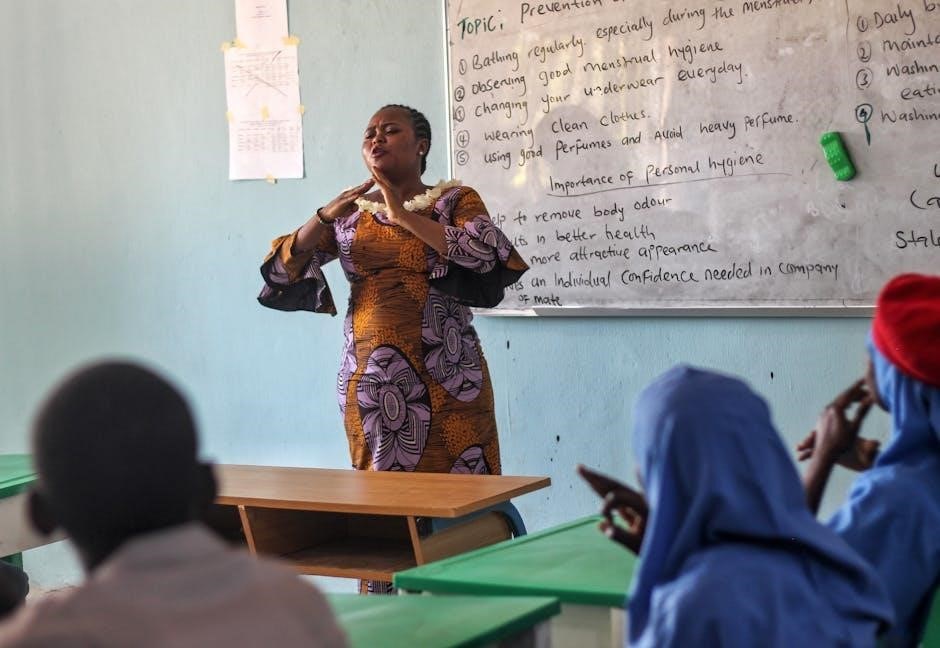This curriculum provides a structured approach to addressing substance abuse through group therapy‚ emphasizing education‚ support‚ and skill development to foster long-term recovery and personal growth.
1.1 Overview of the Curriculum Structure
The curriculum is divided into eight core sections‚ each addressing specific aspects of substance abuse and recovery. It begins with an introduction to the curriculum and the importance of group therapy‚ followed by sections on understanding addiction‚ setting goals‚ core sessions‚ skill development‚ family and community support‚ assessment‚ and additional resources. Each section is designed to build on the previous one‚ creating a comprehensive and structured approach to treatment. Interactive activities and group discussions are emphasized to maximize engagement and effectiveness.

1.2 Importance of Group Therapy in Substance Abuse Treatment
Group therapy is a cornerstone of substance abuse treatment‚ offering a supportive environment where individuals share experiences and learn from one another. It fosters accountability‚ reduces isolation‚ and teaches essential social and coping skills. Group dynamics encourage open dialogue‚ empathy‚ and mutual understanding‚ which are critical for long-term recovery. This collaborative approach complements individual therapy‚ providing diverse perspectives and strategies to overcome addiction‚ making it a vital component of the curriculum.
Understanding Substance Abuse and Addiction
Substance abuse and addiction are complex issues impacting physical‚ mental‚ and social well-being. Understanding their roots and effects is crucial for effective treatment and recovery strategies.
2.1 Definitions and Key Concepts
Substance abuse refers to the harmful or hazardous use of substances‚ including alcohol and drugs‚ impairing physical‚ mental‚ or social well-being. Addiction is a chronic disorder characterized by compulsive substance use despite negative consequences. Key concepts include dependence‚ tolerance‚ withdrawal‚ and relapse. Understanding these definitions helps identify patterns and stages of addiction‚ enabling effective interventions and personalized treatment plans. This foundation is essential for addressing the complexities of substance abuse in group therapy settings.
2.2 The Science of Addiction and Brain Chemistry
Addiction fundamentally alters brain chemistry‚ particularly affecting dopamine pathways linked to reward and pleasure. Substances like drugs and alcohol manipulate neurotransmitter systems‚ creating cycles of craving and consumption. Over time‚ this leads to tolerance and dependence‚ as the brain adapts by reducing natural dopamine production. Understanding these neurobiological changes is crucial for developing targeted interventions to disrupt the addiction cycle and support long-term recovery in group therapy settings.
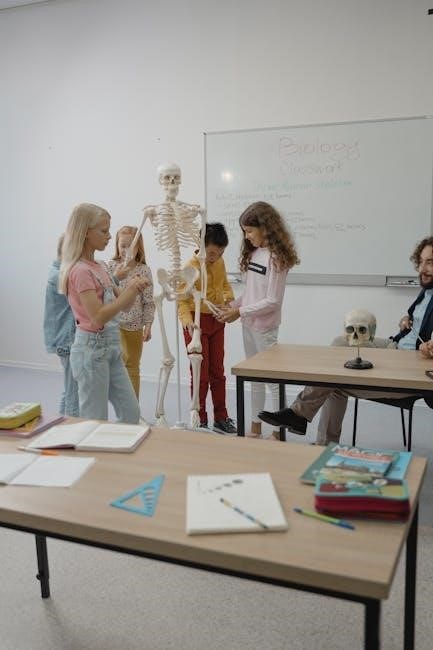
Setting Goals for Group Therapy Sessions
Setting clear‚ achievable goals is essential for guiding the therapy process. Goals are established collaboratively‚ tailored to individual and group needs‚ ensuring a focused and productive experience.

3.1 Short-Term vs. Long-Term Goals
In substance abuse group therapy‚ goals are categorized into short-term and long-term objectives. Short-term goals focus on immediate‚ achievable outcomes‚ such as attending sessions regularly or identifying triggers. These foundational steps build momentum and engagement. Long-term goals‚ however‚ aim for sustained recovery‚ like maintaining sobriety or rebuilding relationships. Both types of goals are essential for a comprehensive treatment plan‚ ensuring progress is measurable and meaningful.
- Short-term: Practical‚ immediate actions.
- Long-term: Sustained behavior change and overall well-being.

3.2 Creating a Safe and Supportive Environment
Establishing a safe and supportive environment is crucial for effective group therapy. This involves fostering trust‚ confidentiality‚ and respect among participants. Facilitators should encourage open communication‚ active listening‚ and empathy. Setting clear boundaries and expectations helps create a nonjudgmental space where individuals feel comfortable sharing their experiences. A supportive environment promotes emotional safety‚ enabling participants to address challenges openly and work collaboratively toward recovery. This foundation is essential for building resilience and sustaining long-term progress.

Core Sessions in the Curriculum
Core sessions focus on the cycle of addiction‚ physical impacts‚ mental health effects‚ and recovery strategies‚ providing practical insights for sustainable recovery.
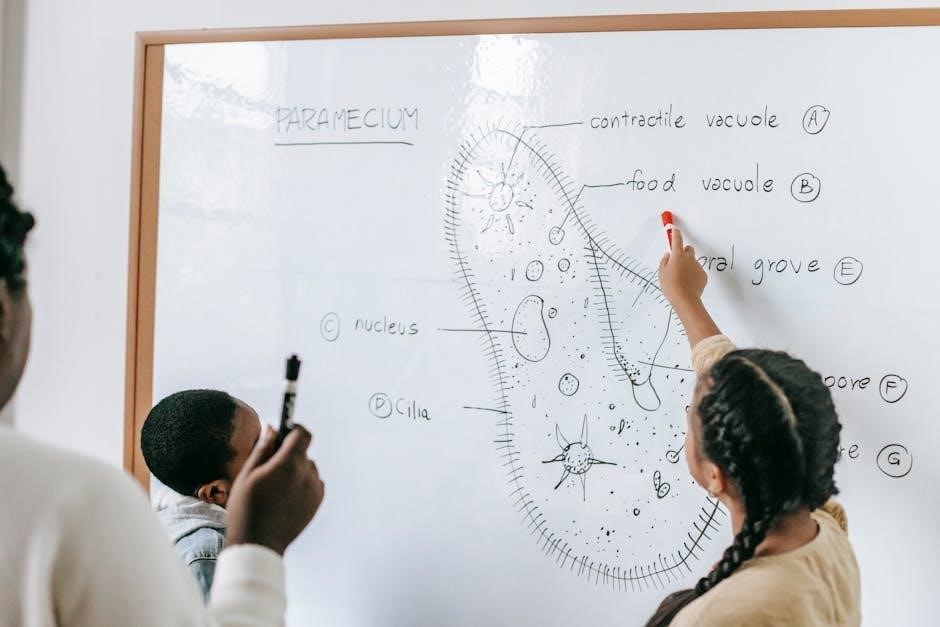
4.1 The Cycle of Addiction and Recovery
The cycle of addiction includes stages like experimentation‚ regular use‚ dependence‚ and addiction‚ often driven by emotional‚ environmental‚ or biological factors. Recovery involves acknowledging the problem‚ seeking help‚ and committing to long-term change. This session explores these phases‚ helping participants understand triggers and develop strategies to break the cycle. By fostering self-awareness and resilience‚ individuals can transition from active addiction to sustained recovery‚ improving overall well-being and quality of life.
4.2 Physical and Mental Health Impacts of Substance Abuse
Substance abuse can lead to severe physical health issues‚ such as organ damage‚ weakened immunity‚ and increased risk of infections. Mentally‚ it often results in anxiety‚ depression‚ and cognitive impairment. Chronic use can alter brain chemistry‚ affecting emotional regulation and decision-making. This session explores the interconnected physical and mental health consequences‚ emphasizing the importance of addressing both for holistic recovery. Understanding these impacts helps participants recognize the urgency of seeking treatment and maintaining sobriety.

Skill Development for Recovery
This section focuses on building essential skills for sustained sobriety‚ including coping strategies‚ stress management‚ and healthy communication‚ to empower individuals for long-term personal growth and recovery.
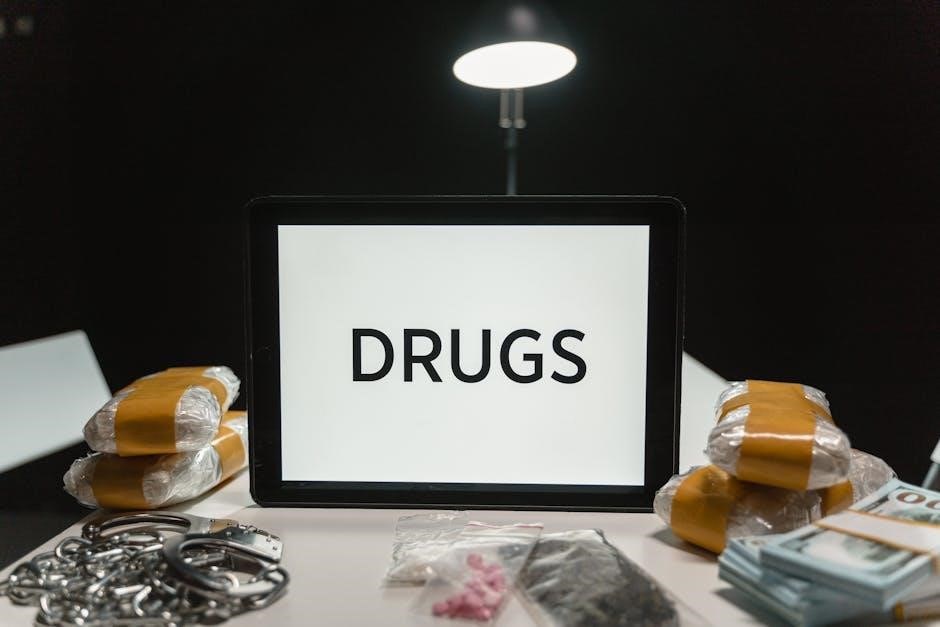
5.1 Coping Mechanisms and Stress Management
This session teaches individuals effective strategies to manage stress and negative emotions without resorting to substances. Techniques include mindfulness‚ breathing exercises‚ and problem-solving skills. Participants learn to identify triggers and develop healthier responses‚ fostering resilience and emotional well-being. Group activities and discussions encourage shared learning and support‚ empowering individuals to handle life’s challenges in a constructive manner. These tools are crucial for maintaining sobriety and overall mental health.
5.2 Building Healthy Communication Skills
This session focuses on developing effective communication skills to enhance interpersonal relationships. Participants learn active listening‚ expressing emotions clearly‚ and using “I” statements to avoid blame. Role-playing activities help practice assertive communication‚ setting boundaries‚ and resolving conflicts respectfully. These skills are vital for rebuilding trust and maintaining healthy connections with family and peers‚ supporting long-term recovery and personal growth.
Family and Community Support
This section explores the crucial role of family and community in the recovery process‚ emphasizing the importance of a supportive network for sustained sobriety and well-being.
6.1 Involving Family in the Recovery Process
Involving family in the recovery process is essential for fostering a supportive environment. Family members can participate in counseling sessions and support groups to understand the challenges of addiction. Education about substance abuse helps them provide emotional support and set healthy boundaries. Active involvement reduces feelings of isolation and strengthens the individual’s commitment to recovery. Family engagement also promotes long-term sobriety by addressing relational dynamics and encouraging open communication. This collaborative approach ensures a holistic healing process for both the individual and their loved ones.
6.2 Community Resources and Support Networks
Community resources and support networks play a vital role in substance abuse recovery by providing accessible services and connections. Local treatment programs‚ support groups‚ and counseling services offer structured environments for healing. Online platforms and helplines‚ such as those from SAMHSA‚ provide additional guidance and referrals. These resources help individuals access professional help‚ peer support‚ and educational materials‚ reducing the risk of relapse and empowering them to build a strong foundation for long-term recovery and resilience.
Assessment and Evaluation
This section focuses on measuring progress through feedback and assessments‚ ensuring continuous improvement in the curriculum’s effectiveness for substance abuse recovery and support.
7.1 Measuring Progress in Group Therapy
Measuring progress in group therapy involves tracking individual and collective advancements through feedback‚ assessments‚ and observable changes. Tools like surveys‚ behavioral observations‚ and goal achievement benchmarks are used to evaluate growth. Regular check-ins help identify improvements in coping skills‚ communication‚ and relapse resistance. This data informs adjustments to the curriculum‚ ensuring it remains effective and tailored to participants’ needs‚ fostering a supportive environment for sustained recovery and personal development.
7.2 Tools for Continuous Improvement
Continuous improvement in the curriculum is achieved through regular feedback sessions‚ progress tracking‚ and utilization of evidence-based practices. Tools such as pre- and post-assessment surveys‚ group discussions‚ and outcome measurements help identify areas for refinement. Peer review and participant feedback are integral to enhancing session effectiveness. By incorporating innovative resources and staying updated on best practices‚ the curriculum evolves to meet the changing needs of participants‚ ensuring a dynamic and impactful approach to substance abuse recovery.
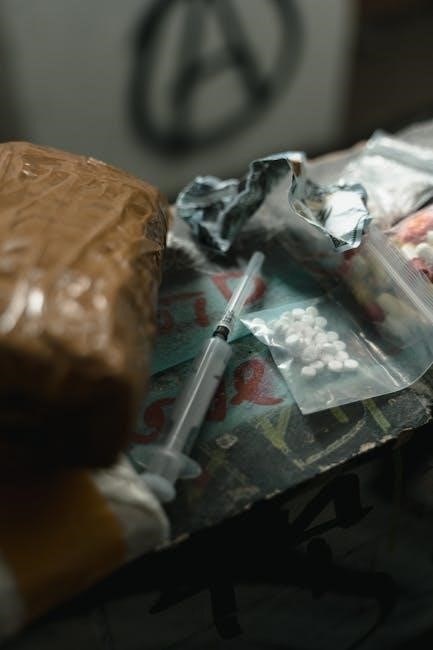
Additional Resources and Next Steps
Participants are encouraged to explore recommended reading materials and online resources for further learning. Post-curriculum support‚ including follow-up groups and mentorship programs‚ is available to ensure sustained recovery progress.
8.1 Recommended Reading and Materials
Key resources include books on addiction recovery‚ such as “The Biology of Desire” and “Mindfulness-Based Relapse Prevention.” Online platforms offer downloadable guides and workshops.
8.2 Post-Curriculum Support and Follow-Up
Post-curriculum support involves ongoing counseling‚ peer support groups‚ and access to community resources. Regular follow-ups ensure sustained progress and address challenges faced by participants.
